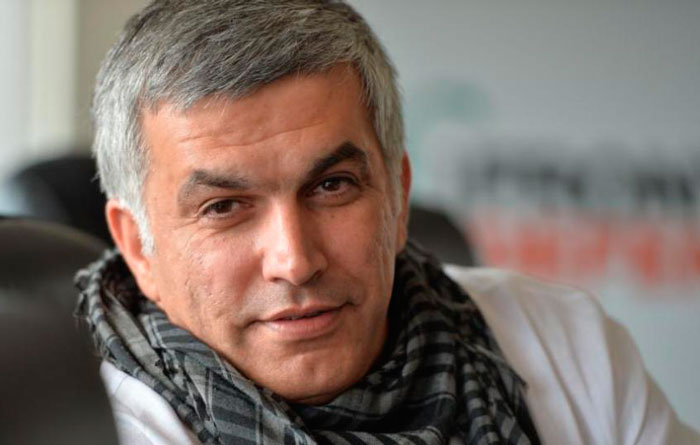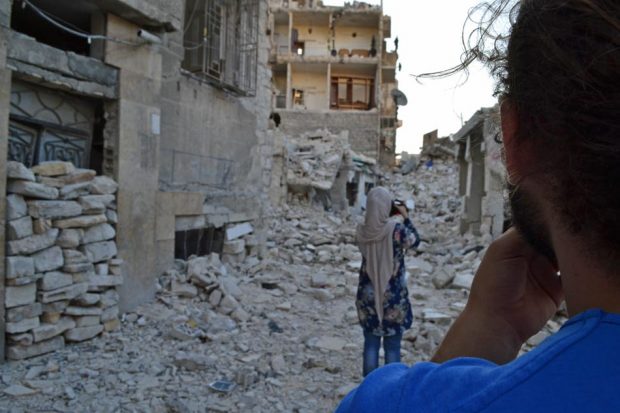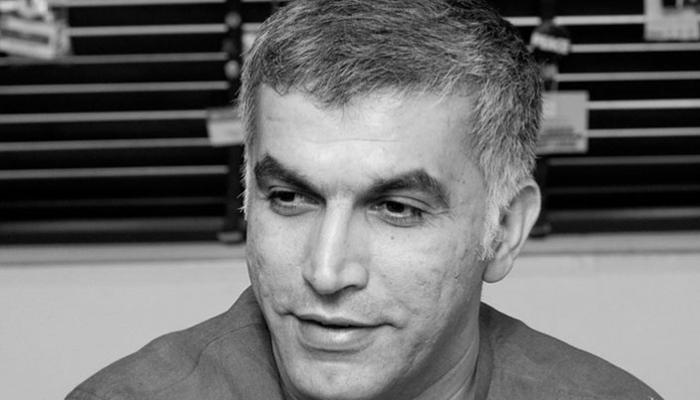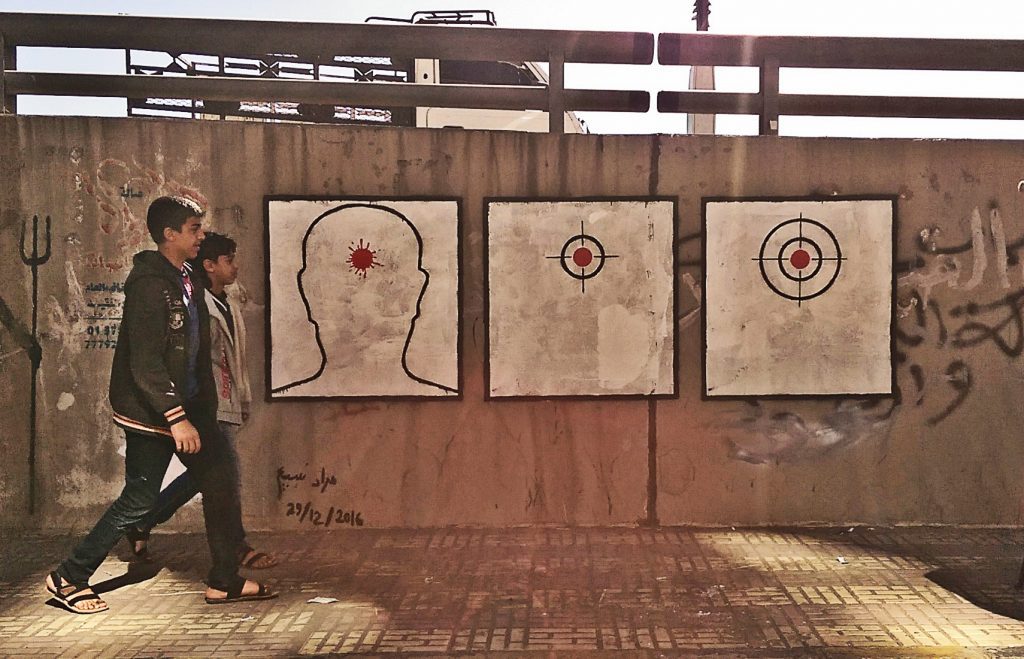13 Mar 2017 | Bahrain, Bahrain News, Middle East and North Africa, News
[vc_row][vc_column][vc_column_text]
The trial of jailed Bahraini human rights activist Nabeel Rajab on charges of spreading “rumours and false news” was deferred for a second time on 7 March until 16 April. The charges relate to televised interviews in 2014 and 2015 in which he criticised authorities. In the meantime, he remains in detention after being denied bail.
This is one of two separate trials Rajab faces. The other is over tweets and retweets about the war in Yemen, which his accusers say “spread rumours in wartime”, insulted a neighbouring country (Saudi Arabia) and offended a statutory body within Bahrain. This trial has been postponed 11 times.
If convicted on all charges, Rajab faces up to 18 years in prison.
Sayed Ahmed Alwadaei, director of advocacy at Bahrain Institute of Rights and Democracy, said: “Bahrain is persecuting Nabeel Rajab for his speech. They would rather jail the messenger on human rights and double-down on repression than listen to what he has to say. The international community must take a stance.”
In February 2017 the European Parliament passed a resolution urging the EU and its member states “to intervene with the Bahraini Government in order to appeal for the release of Nabeel Rajab and of all those held solely on the basis of their peaceful exercise of freedom of expression and assembly”.
Rajab is the winner of a 2012 Index on Censorship Freedom of Expression Award for his efforts against human rights violations by the Bahraini government in 2011. He judged the Index on Censorship Freedom of Expression Awards last year and is also the president of the Bahrain Centre for Human Rights.
Previously, Rajab had been arrested and sentenced to five years in prison in 2012 for criticising Bahraini authorities and for leading pro-democracy demonstrations. He has faced serious health problems due to his numerous detentions, which often were marked by solitary confinement and unclean conditions.
Bahrain regularly breaches basic human rights, and the persecution of Rajab is merely one example of the unjust treatment of those who attempt to exercise their freedom of expression within the country. Authorities have been taking increasingly harsh measures to prevent and punish dissent in the country.[/vc_column_text][/vc_column][/vc_row][vc_row][vc_column][vc_basic_grid post_type=”post” max_items=”4″ element_width=”6″ grid_id=”vc_gid:1489420587513-b30cc26d-4ec8-5″ taxonomies=”716″][/vc_column][/vc_row]
8 Mar 2017 | Digital Freedom, media freedom featured, News, Syria
[vc_row][vc_column][vc_custom_heading text=”This is the first of a series of articles from the Index on Censorship magazine archives exploring the erosion of media freedom around the world.
Writing in the summer 2016 issue of the magazine, Syrian citizen journalist HAZZA AL-ADNAN explored the realities of reporting in a country where a pseudonym and bulletproof vest offer little protection from constant danger” google_fonts=”font_family:Libre%20Baskerville%3Aregular%2Citalic%2C700|font_style:400%20italic%3A400%3Aitalic”][/vc_column][/vc_row][vc_row][vc_column][vc_column_text]

Aleppo: Somehow destroyed buildings and massacres become part of the daily view and even marks to guide people to places. (Photo: Zaina Erhaim)
“THE PSEUDONYM HELPS me to feel safe,” said Ali, a citizen journalist who works under a false name in Syria’s government-held regions. “I always pretend to be completely loyal to Bashar al-Assad’s regime while at the same time I am documenting the abuses perpetrated by his government against the activists and civilians.” Because of fear, many of the journalists inside Syria work under pseudonyms, especially in the government-held areas and those controlled by IS.
Despite the dangers of working as a journalist in Syria, there are still many who strive to report the truth, while trying to minimise the risks to themselves as much as possible. They receive some support and training from Western institutions, from time to time. But most work with local or Middle Eastern media agencies.
“If your aim is to report the truth, you cannot work in areas under government control, because it doesn’t want the truth to come out. You can work in the opposition-controlled areas, but you have to keep hidden from the government forces’ aircraft, and the Russian aircraft, and the IS organisation’s intelligence apparatus,” said Mounaf Abd Almajeed, 26, who works for Fresh Radio, a radio station in Idlib, northwest Syria.
“The government accuses us of terrorism, and the majority of the armed opposition factions do not look upon us favourably, because they confuse intelligence work with journalism,” Abd Almajeed added. “We always have to convince these factions that we are journalists, and not agents of the intelligence organisations of the US or Saudi Arabia or Qatar and so on.”
Some armed opposition factions are extreme Islamists, some of them are moderate Islamists and some of them belong to civilian or secular groups, and there is a state of cold – and sometimes hot – war among them. Abd Almajeed thinks that even if a journalist can gain the trust of a particular faction, the battle is not yet won, because he must now convince the other factions that he has not picked a side or become an agent.
Abd Almajeed tries to minimise the risks of the work by wearing a helmet and bullet-proof jacket when going to areas where clashes are taking place. He rarely works at night for fear of being kidnapped, and he doesn’t ever go to areas held by IS or the government. He believes these precautions have helped him to avoid many injuries, especially around seven months ago, when he was covering one of the battles between government and opposition forces around Aleppo, in northern Syria. When the trench that he was hiding in was targeted in an air raid, which he believes was conducted by Russian aircraft, four journalists were killed, but Mounaf was only slightly injured.
Abd Almajeed believes that Western media NGOs could do more to help by offering the required support to journalists inside opposition areas, but rather have confined their support to Syrian press organisations outside the country.
[/vc_column_text][/vc_column][/vc_row][vc_row equal_height=”yes” content_placement=”middle” el_class=”text_white” css=”.vc_custom_1488903767246{background-color: #dd1f1f !important;}”][vc_column width=”1/2″][vc_custom_heading text=”Protect Media Freedom” font_container=”tag:p|font_size:28|text_align:left” use_theme_fonts=”yes” css_animation=”fadeIn” link=”url:https%3A%2F%2Fwww.indexoncensorship.org%2Fdefend-media-freedom-donate-index%2F|||”][vc_column_text]
We monitor threats to press freedom, produce an award-winning magazine and publish work by censored writers.[/vc_column_text][/vc_column][vc_column width=”1/2″ css=”.vc_custom_1488903306764{background-image: url(https://www.indexoncensorship.org/wp-content/uploads/2013/08/newspapers.jpg?id=50885) !important;background-position: center !important;background-repeat: no-repeat !important;background-size: cover !important;}”][/vc_column][/vc_row][vc_row][vc_column][vc_column_text]
But Ahmed Jalal, 35, editor of the local magazine Al-Manatarah, does not agree. He thinks that the diminished support is due to concern for the safety of their employees, and Syrians working with them, after the country became so dangerous for journalists.
As for the burden of responsibility laid on the journalists inside Syria, Jalal said: “In the early stages of the revolution we did not have a great responsibility to convey the truth to the international community because the door was open to journalists from all over the world, and many of them came in and reported the truth to their communities. But after a year or two of the revolution everything changed because Bashar al-Assad succeeded in getting his propaganda message across to the West that he was fighting terrorists and that the alternative to him was chaos and terrorism.”
Jalal believes that IS’s pursuit of journalists, and execution of some of them, forced Western agencies to withdraw their correspondents, and then the opposition factions’ media made repeated mistakes until the world began to view the Syrian conflict as a “sectarian war between the Alawites and the Shi’a on the one hand and the Sunnis on the other, or as a fundamentalist Islamic revolution that crossed borders, and not a people’s revolution”.
Jalal sighed, took a drag on his cigarette, and continued: “Our responsibility has become great, it is now up to us to convince the international community that we are reporting the truth, which can be expressed as the aspirations for freedom and justice of a people that a criminal regime is killing – and this is what compels us to risk our lives.”
Working under a pseudonym and wearing bullet-proof jackets is all journalists inside Syria can do to minimise the risks, according to Jalal, because nobody recognises the immunity of journalists, and nobody respects the international laws and conventions governing their work. He said: “We are in a jungle … all we can do is persevere, coping with the fear and the grief. However much we try to minimise the risks; hardly a week goes by without our losing a friend or colleague, who has died covering some battle or other, or in the bombing of civilians by government forces or their allies, or in an execution by Da’esh [IS].”
The editor said: “Hardly a day goes by without our seeing the dead body of a child torn apart by Bashar al-Assad’s aircraft.” In the opposition-held areas, ordinary citizens do not look upon journalists favourably.
Jalal added: “Every time we go to take a photograph we encounter people who refuse and say ‘You media people take photos and rake in the money and we get bombed by Bashar al-Assad’s planes because of you taking pictures.’”
Many journalists inside Syria want their output to reach the international community. “Unfortunately, it rarely gets through because most of the journalists in these areas do not possess English or the skills to communicate with the outside world, so when talking to the world they rely on compassion rather than understanding,” said Jalal.
Jalal wishes the armed opposition factions would invite Western media organisations into their areas and provide them with protection. And if that is impossible, then he asks “powerful news agencies like Reuters, Agence France-Presse and the Associated Press, and powerful networks like the BBC and CNN” to put trust in local journalists or citizen journalists in these areas.
Ahmed said: “We have now got good journalists inside the opposition-held areas who have received training from Western institutions such as the Institute for War and Peace Reporting and Reporters Without Borders and the CFI [run by the French Ministry of Foreign Affairs], and we now have training centres in these areas; all that we lack is the trust of the powerful Western agencies and the networks in us.”
[/vc_column_text][/vc_column][/vc_row][vc_row][vc_column][vc_column_text]
Translated by Sue Copeland
The writer of this piece, Hazza al-Adnan, was introduced to Index on Censorship by our 2016 Freedom of Expression Award winner Zaina Erhaim.
Erhaim won the journalism award for using her own skills to train other Syrians to be able to tell their stories too.
Erhaim told Index: “Hazza attended the first training I did in Idlib suburb. He is a lawyer and had no experience in journalism at all. After the training, he started publishing on our website [the Institute of War and Peace’s Damascus Bureau], and when their local radio station Fresh was established, he started working as an editor with them. He writes for many Syrian websites and has passed the training I gave to him to more than 30 others.”
[/vc_column_text][vc_column_text]This article appeared in the summer 2016 issue of Index on Censorship magazine. [/vc_column_text][/vc_column][/vc_row][vc_row content_placement=”top”][vc_column width=”1/3″][vc_custom_heading text=”Danger in truth: truth in danger” font_container=”tag:p|font_size:24|text_align:left” link=”url:https%3A%2F%2Fwww.indexoncensorship.org%2F2016%2F05%2Fdanger-in-truth-truth-in-danger%2F|||”][vc_column_text]The summer 2016 issue of Index on Censorship magazine looks at why journalists around the world face increasing threats.
In the issue: articles by journalists Lindsey Hilsum and Jean-Paul Marthoz plus Stephen Grey. Special report on dangerous journalism, China’s most famous political cartoonist and the late Henning Mankell on colonialism in Africa.[/vc_column_text][/vc_column][vc_column width=”1/3″][vc_single_image image=”76282″ img_size=”medium” alignment=”center” onclick=”custom_link” link=”https://www.indexoncensorship.org/2016/12/fashion-rules/”][/vc_column][vc_column width=”1/3″ css=”.vc_custom_1481888488328{padding-bottom: 50px !important;}”][vc_custom_heading text=”Subscribe” font_container=”tag:p|font_size:24|text_align:left” link=”url:https%3A%2F%2Fwww.indexoncensorship.org%2Fsubscribe%2F|||”][vc_column_text]In print, online. In your mailbox, on your iPad.
Subscription options from £18.
Every subscriber helps support Index on Censorship’s projects around the world.
 SUBSCRIBE NOW[/vc_column_text][/vc_column][/vc_row][vc_row][vc_column][three_column_post title=”Media Freedom” category_id=”9044″][/vc_column][/vc_row]
SUBSCRIBE NOW[/vc_column_text][/vc_column][/vc_row][vc_row][vc_column][three_column_post title=”Media Freedom” category_id=”9044″][/vc_column][/vc_row]
24 Feb 2017 | Bahrain, News
[vc_row][vc_column][vc_column_text]
Nabeel Rajab, co-founder and President of the Bahrain Center for Human Rights, was set to be tried on 21 February for a series of charges including “deliberately spreading false information and malicious rumours with the aim of discrediting the State, “insulting a statutory body,” “disseminating false rumours in time of war” and “offending a foreign country.” The “foreign country” at issue is Saudi Arabia.
On 21 February the High Criminal Court of Bahrain postponed the trial based on charges related to tweets until 22 February. The hearing on charges related to televised interviews has now been postponed to 7 March.
In order to allow judges to hear the testimony of the investigation officer and to give Rajab’s lawyer access to copy of the evidence, the tweet-related trial was pushed back from February 22 to 22 March.
Rajab, who is a 2012 Index on Censorship Freedom of Expression Award winner and a judge for the 2016 awards, has been in police custody since June 2016 after he wrote an article exposing human rights violations in Bahrain for the New York Times.
On 3 February, 19 and two individuals organizations supporting human rights and freedom of expression sent a joint open letter to Boris Johnson calling for Rajab’s release.
If convicted, Rajab faces 18 years total in prison.[/vc_column_text][vc_basic_grid post_type=”post” max_items=”4″ element_width=”6″ grid_id=”vc_gid:1487947058044-297cb21b-a8cd-6″ taxonomies=”3368″][/vc_column][/vc_row]
3 Feb 2017 | Awards, Fellowship, Fellowship 2016, Middle East and North Africa, News, Yemen
[vc_row][vc_column][vc_column_text]
US president Donald Trump’s executive order banning citizens of seven predominantly Muslim countries from travelling to the USA for has had devastating consequences for thousands of people. Among them is Index on Censorship Award winner Murad Subay. The Yemeni street artist is now unable to visit his wife, who is currently studying in the USA.
“It’s really frustrating to even start thinking that I won’t be able to see her for that long,” he told Index. “She was supposed to visit during summer break, however, it seems that she can’t do that now.”
With uncertainty surrounding how the Trump administration’s policy towards Yemen will play out, the couple are now facing the very real prospect of not seeing each other until she finishes her studies four years from now.
“It’s been a really difficult time for both of us because it’s the first time we’ve been away from each other for more than a month,” Subay said. “I can’t say that this doesn’t have its negative effects on my work, for it surely does.”
At home, the worries that have plagued Subay throughout the Obama administration remain, particularly Trump’s continuation – and possible escalation – of his predecessor’s drone strikes in Yemen, which by February 2016 had killed up to 729 Yemenis including 100 civilians. One rural counter-terrorism raid authorised by Trump has already left at least 10 women and children dead, according to Al-Jazeera.
|
Murad Subay is the 2016 Index on Censorship Freedom of Expression Arts Award-winner and fellow. His practice involves Yemenis in creating murals that protest the country’s civil war. Read more about Subay’s work.
|
|
“Trump has no right to make things even worse for Yemenis. Yemen is already suffering from US arms deals with Saudi Arabia that helped fuel this war. Barring Yemenis from entering the USA under his administration only adds to these troubles.”
The war has been hitting close to home for Subay in recent months. Two of his cousins were recruited by warring parties and killed on the battlefield. – Fuad Subay, aged 26, was a soldier killed in Albuka’a, and Yaser Subay, just 14, was recruited by Houthis and killed in Isilan.
On top of this, a close friend of his, the respected investigative journalist Mohammed Alabsi, was killed in an apparent assassination. According to the Yemen Times, Alabsi had gone out for dinner in Sana’a with a cousin on 20 December. A little while later both men were rushed to hospital, where Alabsi died.
“I was told that blood came out of his ears and eyes,” Subay said. “Mohammed was investigating the black markets trading in oil that were associated with high-ranking politicians. I do not know the exact details of this, but what I do know is that Yemen has lost one of its most important and noblest investigative journalists, and that I lost a dear friend.”
An investigation into Alabsi’s death is underway.
Subay addressed a recent wave of violence against civilians, including journalists and public figures, in a mural entitled Assassination’s Eye, painted on the Mathbah Bridge in Sana’a in late December. Part of the Ruins Campaign, the minimalist painting depicts a sniper’s crosshairs training in on a human target.
“It conveys the assassin’s point of view, where it first feels like it is only a part of training on how to hit a target, but then in the final square the bullet ends up in the head of a real person rather than a target board,” Subay explained. “These assassinations have spread vastly since 2012, where they were mostly carried out among the military ranks and politicians. Lately, however, these operations have been targeting civilians too. I was planning to address this issue some time ago after hearing about the assassinations of innocent civilians in different places of the country, and that was just two weeks before I was shocked by the death of my friend.”
Elsewhere, Subay has been asked to serve as a judge for the Italian arts award, Fax for Peace, which invites students and artists from around the world to send pictures, videos or animations on the themes of peace, tolerance, human rights and the fight against all forms of racism. He said of the role: “It is a great pleasure to be selected as a judge in this contest and it is a big responsibility, which I hope to be able to carry out effectively.”
However, with Yemen’s economic circumstances ever worsening, and many working people now into their fourth month without receiving salaries, he sees difficult times ahead.
“It’s very harsh to see people every day looking for anything to eat from garbage, waiting along with children in rows to get water from the public containers in the streets, or the ever increasing number of beggars in the streets. They are exhausted, as if it’s not enough that they had to go through all of the ugliness brought upon them by the war.”
Referring to the deaths of his cousins and his close friend, he added: “No one can live in this country and not be affected by the war. This all happened in the last three or four months. These events make a month in Yemen feel like a year.”[/vc_column_text][vc_basic_grid post_type=”post” max_items=”4″ element_width=”6″ grid_id=”vc_gid:1486138786513-e5ca059b-efd0-1″ taxonomies=”8196″][/vc_column][/vc_row]




